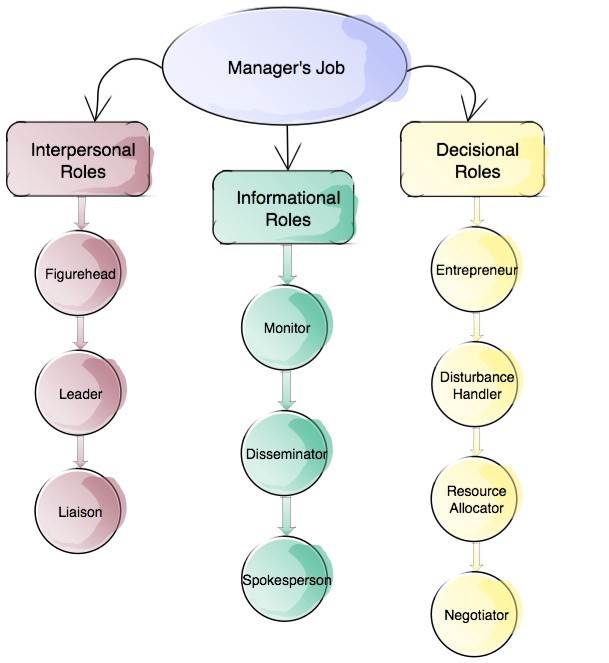Managers wear a lot of hats. Understanding these ?hats,? and reflecting on how you?re wearing them, is the best way to grow as a team leader.
Henry Mintzberg, understood this and organized the roles of management systematically in his 1990 book Mintzberg on Management: Inside our Strange World of Organizations. Since then, the PhD from MIT and internationally renowned academic and author on business and management has gone on to stress the importance of practical application of business theory. Mintzberg maintains that management is often more art than science, evident in his very practical and applicable model outlining 10 Management Roles:
 Albertsuckow.com
Albertsuckow.com
In his book, Mintzberg divides managerial work into three categories: interpersonal roles, informational roles and decisional roles. These roles require developing peer relationships, carrying out negotiations, motivating subordinates, resolving conflicts, establishing information networks, making decisions with little or ambiguous information and allocating resources. In this process, at different times, managers ?wear ten hats? divided into the three categories:
Interpersonal Roles
- The Figurehead: performs ceremonial duties. Examples: greeting visiting dignitaries, attending an employee?s wedding, taking an important customer to lunch.
- The Leader: responsibility for the work of subordinates, motivating and encouraging employees, exercising their formal authority.
- The Liaison: making contacts outside the vertical chain of command including peers in other companies or departments, and government and trade organization representatives.
Informational Roles
4. The Monitor: scans the environment for new information to collect.
5. The Disseminator: Passing on privileged information directly to subordinates.
6. The Spokesperson: Sharing information with people outside their organization. Examples: a speech to a lobby or suggesting product modifications to suppliers.
Decisional Roles
7. The Entrepreneur: Seeks to improve the unit by initiating projects.
8. The Disturbance Handler: Responds involuntarily to pressures too severe to be ignored. Examples: a looming strike, a major customer gone bankrupt, or a supplier reneging on a contract.
9. The Resource Allocator: Decides who gets what.
10. The Negotiator: Committing organizational resources in ?real-time? with the broad information available from their informational roles.
Applying the Model for Improvement
As a manager, you may tend to shy away from some of these roles that you don?t favor i.e. you may tend to avoid monitoring and handling disturbances. Recognizing your strengths and weaknesses according to these ten roles can help you to develop your skills and knowledge and become a more well rounded manager.
ACTIVITY: Think about how much time you spend on each role. Write down the ten roles on a piece of paper and score yourself from 1?5 on each role with 1 being ?Very skilled? to 5 being ?Not skilled at all.? Consult the list below for improvement tips in the roles where you scored the lowest.
Tips for Improvement
- Figurehead: If you struggle wearing this hat, start with cultivating humility and empathy. Focus on using your energy to be a good role model and become more aware of your image and reputation and how you can consistently display model behavior.
- Leader: Anyone can be a leader, but not everyone can be an authentic leader who is respected by his or her team. The most important skill here to develop to improve is emotional intelligence.
- Liaison: Not everyone is comfortable being a networking ham, but it?s part of the job. You can start by attending small networking events and work your way out.
- Monitor: The challenge of this aspect lies in its details. Become a better ?skimmer? so you can scan through a lot of information and get to the big picture without experiencing information overload. It?s also important in this area to keep up with industry news.
- Disseminator: If you struggle in this area, work on improving your communication skills. Knowing not only what to share, but how and with whom. If you have difficulty expressing things properly, engage a colleague to help in the beginning with proofreading or being a second pair of eyes as you adjust in this role.
- Spokesperson: This is an area where a lot of people feel challenged. Read blogs and research how to deliver great presentations and how to deal with the media. Speak with your company leaders to discuss how the company?s brand or image should be represented in the community.
- Entrepreneur: Work on problem solving and creativity skills or again, if this is not your strength, employ colleagues who excel here with brainstorming sessions or ?crazy ideas? meetings. In addition, change management is a huge necessity in this area.
- Disturbance Handler: You can read up on how to handle team conflict to improve your conflict resolution skills, but it may also be helpful to constructively coach team members who have a habit of bringing emotion into the office.
- Resource Allocator: To wear this hat, prioritization is key. Take advantage of online tools and systems for this as well as budgeting tips.
- Negotiator: Read about Distributive Bargaining or Win-Win Negotiations to beef up your skills. Role playing can also be an important tool here to strengthen your ability to negotiate.
Every manager can use a little help. Visit taskworld.com to learn why managers in over 4000 companies across 80 countries use Taskworld to improve their team?s performance.

About the author

Jessica Zartler is a digital nomad and Multimedia Marketing Consultant & Content Strategist for Taskworld. Before working in Public Relations and Marketing, she was an award-winning television reporter and multimedia journalist. When she is not hunting for the best content on the web to share with TW users, blogging or producing videos, she is teaching yoga, cooking, playing drums and travelling.

